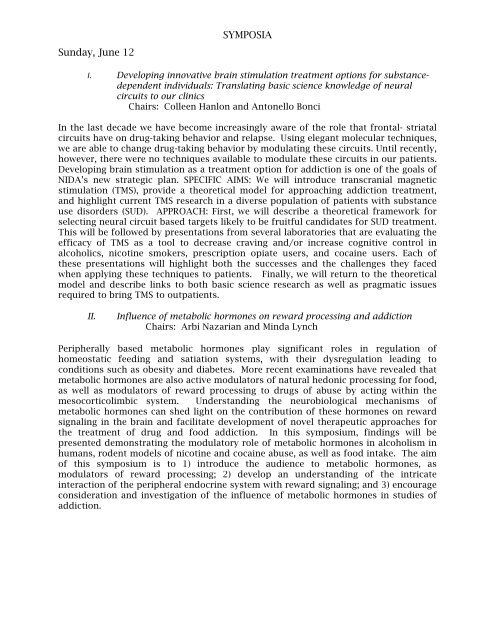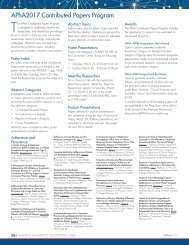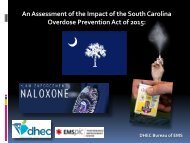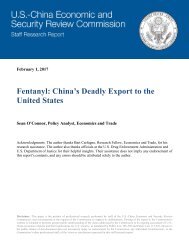CPDD 78th Annual Scientific Meeting Program
2016-78th-CPDD-Program-Book-6-07-16FINAL
2016-78th-CPDD-Program-Book-6-07-16FINAL
You also want an ePaper? Increase the reach of your titles
YUMPU automatically turns print PDFs into web optimized ePapers that Google loves.
Sunday, June 12<br />
SYMPOSIA<br />
I. Developing innovative brain stimulation treatment options for substancedependent<br />
individuals: Translating basic science knowledge of neural<br />
circuits to our clinics<br />
Chairs: Colleen Hanlon and Antonello Bonci<br />
In the last decade we have become increasingly aware of the role that frontal- striatal<br />
circuits have on drug-taking behavior and relapse. Using elegant molecular techniques,<br />
we are able to change drug-taking behavior by modulating these circuits. Until recently,<br />
however, there were no techniques available to modulate these circuits in our patients.<br />
Developing brain stimulation as a treatment option for addiction is one of the goals of<br />
NIDA’s new strategic plan. SPECIFIC AIMS: We will introduce transcranial magnetic<br />
stimulation (TMS), provide a theoretical model for approaching addiction treatment,<br />
and highlight current TMS research in a diverse population of patients with substance<br />
use disorders (SUD). APPROACH: First, we will describe a theoretical framework for<br />
selecting neural circuit based targets likely to be fruitful candidates for SUD treatment.<br />
This will be followed by presentations from several laboratories that are evaluating the<br />
efficacy of TMS as a tool to decrease craving and/or increase cognitive control in<br />
alcoholics, nicotine smokers, prescription opiate users, and cocaine users. Each of<br />
these presentations will highlight both the successes and the challenges they faced<br />
when applying these techniques to patients. Finally, we will return to the theoretical<br />
model and describe links to both basic science research as well as pragmatic issues<br />
required to bring TMS to outpatients.<br />
II.<br />
Influence of metabolic hormones on reward processing and addiction<br />
Chairs: Arbi Nazarian and Minda Lynch<br />
Peripherally based metabolic hormones play significant roles in regulation of<br />
homeostatic feeding and satiation systems, with their dysregulation leading to<br />
conditions such as obesity and diabetes. More recent examinations have revealed that<br />
metabolic hormones are also active modulators of natural hedonic processing for food,<br />
as well as modulators of reward processing to drugs of abuse by acting within the<br />
mesocorticolimbic system. Understanding the neurobiological mechanisms of<br />
metabolic hormones can shed light on the contribution of these hormones on reward<br />
signaling in the brain and facilitate development of novel therapeutic approaches for<br />
the treatment of drug and food addiction. In this symposium, findings will be<br />
presented demonstrating the modulatory role of metabolic hormones in alcoholism in<br />
humans, rodent models of nicotine and cocaine abuse, as well as food intake. The aim<br />
of this symposium is to 1) introduce the audience to metabolic hormones, as<br />
modulators of reward processing; 2) develop an understanding of the intricate<br />
interaction of the peripheral endocrine system with reward signaling; and 3) encourage<br />
consideration and investigation of the influence of metabolic hormones in studies of<br />
addiction.







